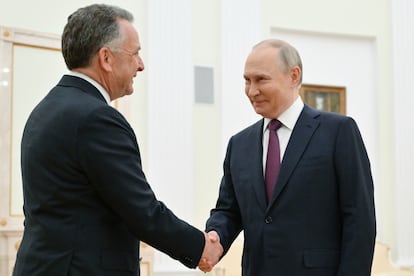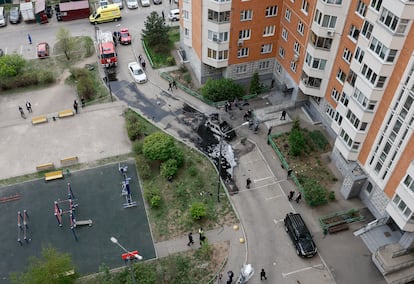Kremlin sees ‘breakthrough’ in Ukraine negotiation after Putin’s meeting with Trump envoy
“We are on the right track,” declares Russian Foreign Sergey Minister Lavrov, who adds that there are still details to be resolved


The United States threatens to leave Ukraine to its own devices while Russia has welcomed, with some optimism, the White House’s attempts to impose a peace agreement on Kyiv. However, this has not stopped the Kremlin from redoubling its bombardment of civilians in the invaded country. “The president of the United States believes, and I think rightly so, that we are moving in the right direction,” Russian Foreign Minister Sergey Lavrov told CBS on Friday regarding the negotiations. For Lavrov, the Kremlin is ready to sign the alleged peace agreement, “but there are still some details to be fine-tuned”. These statements preceded the meeting of about three hours that Donald Trump’s special envoy, Steve Witkoff, held with President Vladimir Putin. “Today’s conversation has brought our positions even closer not only on Ukraine, but also on other international issues,” stressed Yuri Ushakov, foreign policy adviser to the Russian leader.
Ushakov noted that the two sides discussed the possibility of direct negotiations between Russia and Ukraine, a situation that last occurred at the abortive talks in Turkey in March and April 2022.
Another member of the Kremlin negotiating team, Kirill Dmitriev, head of the Russian sovereign wealth fund and a person close to Putin’s family, summed up the meeting tersely: “Progress has been made.”
Trump had suggested before the meeting — contrary to the basic principles of the post-1945 international legal order — recognition of Russia’s annexation of the Crimean Peninsula and the rest of the occupied territories in Ukraine. However, for Moscow, these territories are merely a separate issue in its plans: Putin wants to return Ukraine to Kremlin control, directly or indirectly, and to do so, he needs its disarmament.
At approximately the same time as Witkoff arrived in Moscow, a car bomb killed Yaroslav Moskalik, deputy head of the Main Operations Directorate of the Russian General Staff, just outside the capital, the second high-ranking general to be killed on Russian soil in four months. Ukrainian intelligence killed Igor Kirillov, head of Russia’s chemical and biological defense forces, last December.
On the other side of the front lines, Russian ballistic missiles and drones are terrorizing Ukrainian cities with greater determination than ever. Moscow isn’t concerned that its latest massacres of civilians could jeopardize Trump’s support. Lavrov stated that Russian forces are attacking exclusively “military targets and civilian buildings used by the military,” despite the images of children and pregnant women trapped in the rubble of residential blocks in Kyiv.
Trump has proposed a “freeze” in the fighting on the front lines. In exchange for this truce, a modern American president would for the first time legitimize the conquest of territories by force by demanding that Kyiv recognize Russia’s annexation of Crimea — China, Moscow’s ally, does not. Furthermore, Washington is demanding Ukraine formally reject joining NATO and advocates lifting sanctions against Russia.
For Putin, it’s a tempting offer, but the Russian leader didn’t launch his all-out invasion of Ukraine to control only medium-sized towns like Soledar and Bakhmut, now devastated, but rather to force Kyiv into his sphere of influence.
“Any agreement would be a tactical manoeuvre [by Moscow],” notes Russian political scientist Tatiana Stanovaya on X. “Putin appears genuinely convinced that Ukraine, under its current leadership, cannot uphold such commitments and that domestic turmoil is inevitable,” adds the Carnegie expert, although she stresses that the fundamental condition imposed by Moscow is the end of Western arms shipments: “Without this, he would not consider the deal acceptable.”
Since the talks began, the Russian government has insisted that it will not accept the deployment of international peacekeeping troops in Ukraine. According to The Times, the United Kingdom has reconsidered this measure because “the risks are too high and there are not enough forces to carry out such a task.”
However, the European Union and the United Kingdom say they are not willing to leave Ukraine alone and have made other proposals to Washington, according to documents seen by Reuters. Brussels’ public position is to maintain military support for Kyiv and defend the country’s territorial integrity: “Crimea is Ukraine.”
Russia rearms
Putin has hinted this week that he’s not contemplating a definitive peace, but rather even greater rearmament. On Friday, the Russian president discussed with his Security Council how to further strengthen his military-industrial complex. The Kremlin leader met on Wednesday with the heads of Russian arms companies to review their massive arms production.
Russian factories have doubled their supplies of weapons and electronic warfare equipment, and have delivered more than 4,000 armored vehicles and 1.5 million drones to their troops. “I know very well, and so do many of those participating in this meeting: these weapons are still scarce, they are not enough,” Putin told the business leaders, despite the siren calls of a possible truce.
Putin is 72. His latest constitutional reform, in the midst of the pandemic, formally allows him to remain in power until 2036. This means that, health permitting, the leader has the same time remaining until his conquest of Crimea in 2014. And his imperialist ambitions have not waned after the initial failure of his invasion of Ukraine in 2022.
“It’s important for Putin to reclaim Crimea because he wants to go down in history as a famous territorial collector. He dreamed of reclaiming all of Ukraine, but failed, so at this stage he’s trying to internationally legitimize the seizure of at least a piece of foreign land,” Russian journalist Ekaterina Kotrikadze said on her YouTube channel.
Furthermore, the Kremlin could break the peace agreements at any time, as it has already violated dozens of other treaties by invading Ukrainian territory over the past decade. Moscow believes Zelenskiy is illegally in power by not holding elections while Russia bombs its cities. “Any document signed by Zelenskiy could be challenged [in the future] for its illegitimacy,” Putin’s spokesman, Dmitry Peskov, said in an interview with the French outlet Le Point.

One of the challenges the Kremlin faces if it were to accept a truce now is how it fits into an increasingly radicalized Russian society. From the first minute of the invasion, Putin has set as his goals the total disarmament and “denazification” of Ukraine, a euphemism for replacing the Zelenskiy government and other administrations with a Kremlin-friendly authority.
The consensus among Russian military personnel this newspaper has had access to, from mercenaries and volunteers to regular troops, is that Putin is their supreme commander-in-chief and they will obey his orders no matter what, although they do not hide the fact that halting the offensive now would be a disappointment.
However, the Kremlin has strengthened its control within the military with a sweeping purge within the Ministry of Defense. General Ivan Popov, one of the “heroes” who stabilized the front in 2023 and criticized the bleeding among his troops caused by the high command, was sentenced this Thursday to five years in prison on a controversial corruption charge.
In any case, allowing an independent Ukraine would be a 180-degree turn in the Kremlin’s rhetoric. “We will not abandon the denazification of the Kyiv regime, which is legislatively and physically exterminating everything Russian,” Lavrov proclaimed at the end of March.
“We are the heirs of the great victory won for us by the heroes of the past. As long as we remember this, we will be invincible. Victory was ours. Victory remains with us. Victory will be ours,” said Deputy Chairman of the Russian Security Council Dmitry Medvedev Friday at an event marking the 80th anniversary of the end of the Great Patriotic War, the Soviet front in World War II. For Putin, the invasion of Ukraine is his personal Great Patriotic War, and its outcome will determine his place in history.
Sign up for our weekly newsletter to get more English-language news coverage from EL PAÍS USA Edition
Tu suscripción se está usando en otro dispositivo
¿Quieres añadir otro usuario a tu suscripción?
Si continúas leyendo en este dispositivo, no se podrá leer en el otro.
FlechaTu suscripción se está usando en otro dispositivo y solo puedes acceder a EL PAÍS desde un dispositivo a la vez.
Si quieres compartir tu cuenta, cambia tu suscripción a la modalidad Premium, así podrás añadir otro usuario. Cada uno accederá con su propia cuenta de email, lo que os permitirá personalizar vuestra experiencia en EL PAÍS.
¿Tienes una suscripción de empresa? Accede aquí para contratar más cuentas.
En el caso de no saber quién está usando tu cuenta, te recomendamos cambiar tu contraseña aquí.
Si decides continuar compartiendo tu cuenta, este mensaje se mostrará en tu dispositivo y en el de la otra persona que está usando tu cuenta de forma indefinida, afectando a tu experiencia de lectura. Puedes consultar aquí los términos y condiciones de la suscripción digital.








































